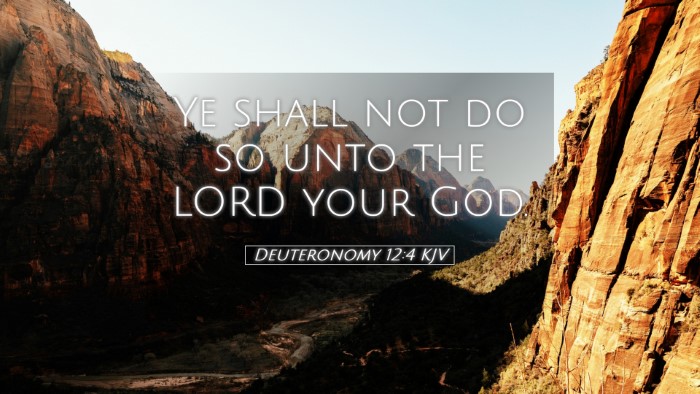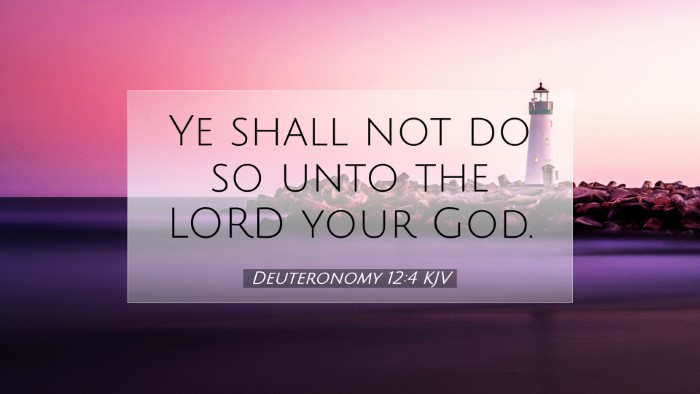Commentary on Deuteronomy 12:4
Verse Text: "You shall not worship the LORD your God in that way."
Overview
Deuteronomy 12:4 is part of a larger discourse in which Moses instructs the Israelites on proper worship practices as they prepare to enter the Promised Land. The command highlights the importance of maintaining the purity of worship and avoiding the corrupt practices of surrounding nations. In understanding this verse, several commentaries provide rich insights that will aid pastors, students, theologians, and Bible scholars.
Commentary Insights
-
Matthew Henry's Commentary
Henry emphasizes the necessity of true worship and warns against the syncretism that often leads to the corruption of worship practices. He notes that Israel was to distinguish themselves from the heathens by adhering to the directives of God’s law. This verse serves as a reminder that the way of worship is not arbitrary but is defined by God's will.
Key Points:
- Worship must be in accordance with God's revealed will, not human innovation.
- Idolatrous practices from surrounding cultures should be avoided to maintain holiness and distinctiveness.
-
Albert Barnes' Notes
Barnes reflects on the contextual significance of this command, highlighting how it serves as a preventative measure against the spiritual pitfalls that can come from adopting foreign worship methods. He articulates that such practices can dilute the essence of God’s covenant relationship with His people.
Key Points:
- The prohibition is not only a rejection of pagan methods but an affirmation of a unique relationship with God.
- True worship involves both spirit and truth, aligning with the spiritual integrity demanded by God.
-
Adam Clarke's Commentary
Clarke offers a historical lens through which to view this directive, noting the cultural influences that threaten to sway Israelite worship. He points to examples of how other nations worship their gods through various rituals and sacrifices, all of which are to be shunned. For Clarke, the verse serves as a cornerstone for understanding the exclusivity of Yahweh's worship.
Key Points:
- The call for exclusive worship emphasizes the singularity of God and His authority over Israel.
- Clarke warns that the blending of faith with secular practices leads to a compromise that can erode true spirituality.
Theological Implications
The admonition found in Deuteronomy 12:4 invites a broader reflection on the nature of worship and the heart postures of believers. This verse underlines that worship is not merely a set of actions but is intrinsically linked to one's relationship with God. Every attempt to worship outside of the parameters set by God is tantamount to rebellion against His sovereignty.
Key Takeaways:
- Worship involves adherence to God's commandments, underscoring the importance of scriptural authority in guiding worship methods.
- The relationship between Israel and God constitutes a fundamental model for modern Christian worship practices; thus, wisdom and discernment are required.
Conclusion
Deuteronomy 12:4 stands as a powerful reminder to God's people about the sanctity and exclusivity of true worship. The insights from Matthew Henry, Albert Barnes, and Adam Clarke provide a multifaceted understanding of the verse, enriching the discourse on worship. For pastors and theologians, this verse necessitates a vigilant guarding of the sanctity of worship practices against external influences that may compromise a believer's relationship with God. In promoting the purity of worship, ministers can guide congregations to experience deeper connections with the divine, rooted firmly in Scripture.


